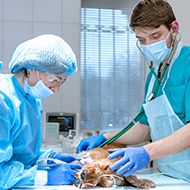RCVS publishes new guidance on VetGDP

The guidance includes information about the programme's structure and the process for its completion.
The RCVS has published new guidance outlining what practices need to know about the forthcoming RCVS Graduate Development Programme (VetGDP).
The guidance includes information about the programme’s structure, including how to implement the scheme, more information on the online portfolio, and the process for completion of the programme.
It includes details about the VetGDP advisor role - with advice on the types of support activities they should be prepared to provide for their new graduate - and details about the e-learning, which VetGDP advisors will be required to undertake.
The document also introduces a new locum VetGDP role to support graduates in practices or workplaces in exceptional circumstances, such as where the VetGDP advisor has left unexpectedly. Prospective VetGDP advisors can volunteer to become a locum VetGDP advisor when they begin the online learning to support graduates within their local area.
Dr Sue Paterson FRCVS, chair of the RCVS education committee, said: “VetGDP builds on what we all do in practice every day when we have a new graduate – we build their confidence by starting with simple, straightforward tasks, and move through to more complex tasks as their knowledge and experience grows. The VetGDP will support graduates through that process while also providing the VetGDP Advisers with the appropriate skills and knowledge to maximise that support.
“The transition from being a student to a veterinary graduate can be truly daunting and I certainly remember in my first few months of practice how important the support of a more experienced colleague was, to help me reflect and learn from my mistakes, as well as celebrate my successes.”
She continued: “Working with their VetGDP Adviser, new graduates will be able to decide where they want to focus and where they need support. It will enable the graduates to hone their skills in all the day-to-day activities they need to do in practice. Building their confidence means they will develop more quickly into competent, resilient members of the veterinary team.
“This new and comprehensive programme guide will provide practices with an overview of what they need to do to prepare for their veterinary graduate recruitment this summer and demonstrate how VetGDP will benefit all parties – the graduate, the practice, the wider profession and the animals we care for.”



 The Veterinary Medicines Directorate (VMD) is inviting applications from veterinary students to attend a one-week extramural studies (EMS) placement in July 2026.
The Veterinary Medicines Directorate (VMD) is inviting applications from veterinary students to attend a one-week extramural studies (EMS) placement in July 2026.